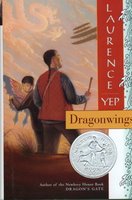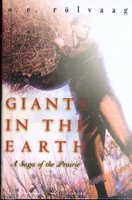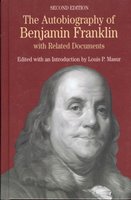What a collection of treasures! Fifteen books for students in grades K-12 all about "Becoming American." Each of our two libraries received all fifteen books and this blog is a place to learn more about them and also discuss them. Have you read any of these great books?
Each book has a place for you to post your comments about it. There is a suggested question to ponder as you comment. The comments are moderated by me, Mrs. Lundquist, so they won't appear right away. I will receive all of your comments, so don't forget to engage in actual thinking before you type!
Friday, September 01, 2006
Thursday, August 31, 2006
Watch The Stars Come Out by Rikki Levinson, pictures by Diane Goode
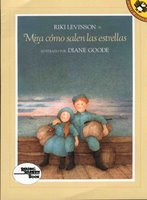
A grandmother tells her grandchildren the story of her own mama who came to America as a little girl on a boat crossing the Atlantic with her brother. There is a happy reunion with their parents after they see the Statue of Liberty! Many of our own ancestors have shared stories like this with us. Is this story similar to your family's stories? Share your comments on this book!
We have this title in English and Spanish.
Wednesday, August 30, 2006
The Lotus Seed by Sherry Garland, pictures by Tatsuro Kiuchi
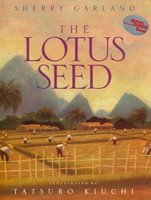
A young Vietnamese girl saves a lotus seed and carries it with her everywhere to remember a brave emperor and the homeland that she has to flee. As a grandmother in America the lotus grows and carries her memories and stories to her grandchildren.
Many families have items that hold memories from earlier generations. Does yours? Please share an item and its story in the comments.
Tuesday, August 29, 2006
Grandfather's Journey by Alan Say
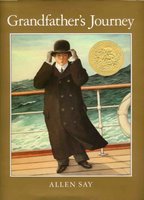 A Japanese American man tells the story of his grandfather who came to America but still loved Japan.
A Japanese American man tells the story of his grandfather who came to America but still loved Japan.Like the narrator of this story, many Americans hold strong feelings in their hearts about their ancestors' homeland. Does your family celebrate a particular ethnic heritage? What do you do? Please share an example in the comments.
Monday, August 28, 2006
Immigrant Kids by Russell Freedman
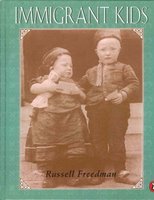
Imagine being the new kid in town when the old town was across the ocean! This book describes what it was like to be an immigrant kid in the late 1800's and early 1900's and includes photographs of these kids at home, school and work.
What kinds of jobs or schools did your immigrant ancestors have when they first came to America? Panther Readers, please share a story in the comments!
Sunday, August 27, 2006
The People Could Fly: The Picture Book
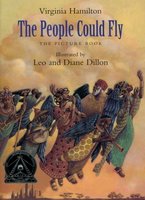
This African American folktale is retold by Virginia Hamilton and beautifully illustrated by Leo and Diane Dillon. When Africans were captured for slavery "The ones that could fly shed their wings. They couldn't take their wings across the water on the slave ships. Too crowded, don't you know." In this tale, slaves call upon the ancient magic of their ancestors to fly away from their sadness and starvation.
Not all immigrants were happy to be in America. Does your family have any stories of people who were better off in the old country? Share an example in the comments.
Saturday, August 26, 2006
Rip Van Winkle by Washington Irving, pictures by Arthur Rackham
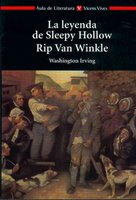
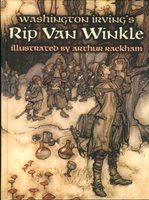 Rip Van Winkle goes to sleep in the Catskill Mountains when King George III is on the throne and awakens 20 years later when George Washington is president. Times change so quickly!
Rip Van Winkle goes to sleep in the Catskill Mountains when King George III is on the throne and awakens 20 years later when George Washington is president. Times change so quickly!We own this title in English and Spanish, but only the English version has the beautiful illustrations by Arthur Rackham.
Early American immigrants experienced a lot of change in their lifetimes, too. Who was the president of the United States when you were born AND name one thing, anything, that has come along in your lifetime. It could be an invention, a new gadget, a movement, a type of music or technology or even a fad. Tell us about it in the comments with your comment on the book.
Friday, August 25, 2006
In the Year of the Boar and Jackie Robinson by Bette Bao Lord, pictures by Marc Simont
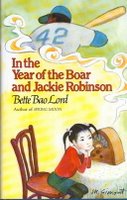 It is 1947 and Shirley Temple Wong and her family have settled in Brooklyn, NY from China. She learns American ways at school, her neighborhood and through the hope she gets from Jackie Robinson, hero of the Brooklyn Dodgers.
It is 1947 and Shirley Temple Wong and her family have settled in Brooklyn, NY from China. She learns American ways at school, her neighborhood and through the hope she gets from Jackie Robinson, hero of the Brooklyn Dodgers.Shirley is inspired by Jackie Robinson's achievements and the support he gets from so many Americans. Who inspires you today and why?
Thursday, August 24, 2006
Rifles for Watie by Harold Keith
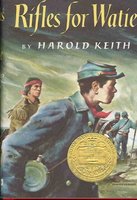
With fighting erupting around his Kansas farm, 16-year-old Jefferson Davis Bussey can hardly wait to join the Union forces. When he infiltrates Colonel Watie's Confederate camp as a spy, he discovers the enemy is much like himself -- only fighting for a different cause. Stand Watie is the leader of Cherokee raids in the western campaign of the United States Civil War!
Jeff Bussey grows up during his experiences in this dark and difficult war. He encounters all sorts of people, good and evil. Comment here on the book and also on a character of your choice using the idea that difficult circumstances made Jeff Bussey a stronger man.
Wednesday, August 23, 2006
The Glory Field by Walter Dean Myers
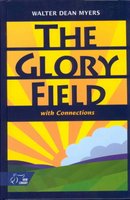
One family's 250 year history is traced from 1750 when Muhammad Bilal in Sierra Leone is captured and brought to the English colonies into slavery. Family members are depicted in the civil war, great depression and civil rights movement. The Glory Field refers to a particular plot of land in South Carolina that plays a role in their family history.
Panther readers, comment on a character in The Glory Field who stood up for personal beliefs and describe how that is part of being American.
Tuesday, August 22, 2006
A Tree Grows in Brooklyn by Betty Smith
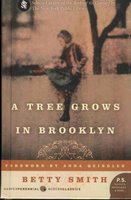 Francie Nolan gains resiliency and strength growing up in the Brooklyn slums at the turn of the last century. This story emphasizes the role of family, neighborhood and society in the lives of immigrants.
Francie Nolan gains resiliency and strength growing up in the Brooklyn slums at the turn of the last century. This story emphasizes the role of family, neighborhood and society in the lives of immigrants.Panther Readers, as you comment on the book discuss the shame Francie and her friends feel about being poor. Why did they feel that way? Do we feel the same way today?
Monday, August 21, 2006
Dragonwings by Laurence Yep
Sunday, August 20, 2006
Death Comes for the Archbishop by Willa Cather
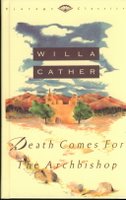
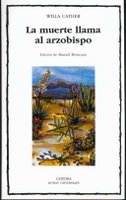
Two Roman Catholic priests travel and work in the American Southwest of the 1850's. This book, which reads like a series of short stories, relates their encounters with many different people. The Roman Catholic Church played a defining role in that region, first through the Spanish, whose descendents welcomed the priests and later through the missions. We own this title in English and Spanish.
As you comment on this book, see if you can make some sense of the title itself. What does Death Comes for the Archbishop refer to?
Saturday, August 19, 2006
Barrio Boy by Ernesto Galarza
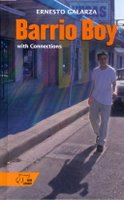
This is the true story of the author who was born in Mexico, emigrated to California with his family for safety during the Mexican Revolution and went on to graduate from Stanford and Columbia. Ernesto Galarza was nominated for a Nobel Prize in Literature in 1979.
When some people became Americans they brought certain vocabulary words with them. When you comment on this book, please include some words you found in this book that are Spanish in origin that became part of the American English language.
Friday, August 18, 2006
Giants in the Earth: A Saga of the Prairie by Ole Edvart Rølvaag
Autobiography of Benjamin Franklin, edited by Louis P. Masur
Subscribe to:
Posts (Atom)
